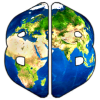Lets move polar bears to Antarctica
Polar bears in Antarctica?
14 members have voted
-
1. How do you feel about assisted migration?
-
The potential loss of species and diversity is too high not to actively assist by moving species to new habitats2
-
A good idea if a species would find their way to the new location given enough time, and we're just speeding up the process0
-
Should only be undertaken in very special cases where the possible effects of the introduced species are well understood8
-
Leave nature alone and let natural selection do its job4
-


Recommended Posts
Create an account or sign in to comment
You need to be a member in order to leave a comment
Create an account
Sign up for a new account in our community. It's easy!
Register a new accountSign in
Already have an account? Sign in here.
Sign In Now